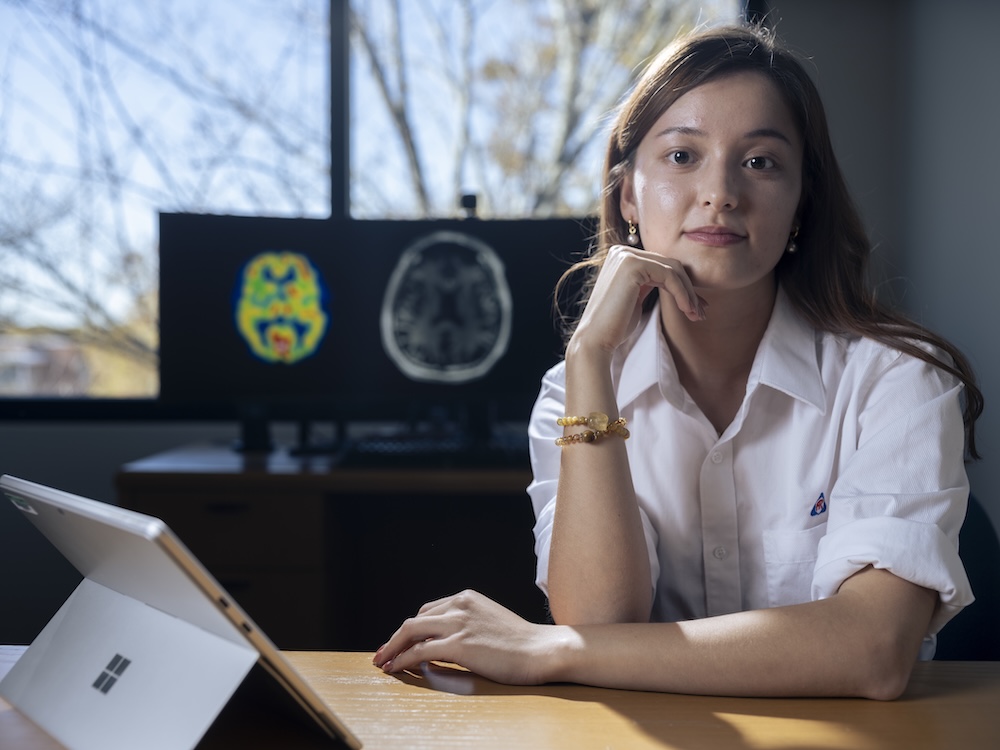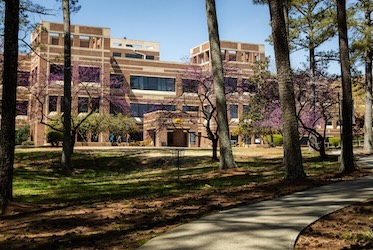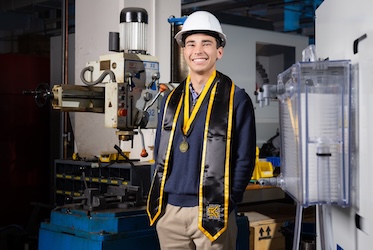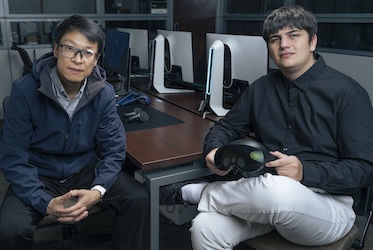

KENNESAW, Ga. | Nov 24, 2025

By the time she reached middle school, she noticed that her grandfather began to suffer from memory loss, making their everyday conversations more difficult. Watching someone who had once been so engaged and full of life slowly lose his cognitive abilities left a lasting impact on Callaway and ultimately shaped her interest in neurological health.
Inspired by her grandfather’s struggle with memory loss, the Kennesaw State University computer science student is now turning her passion for technology into purpose. Through Assistant Professor of Computer Science Chen Zhao’s lab, she is helping advance Alzheimer’s disease research using artificial intelligence.
“I wanted to help people like him,” said Callaway, a native of Guizhou, China. “This project showed me that computer science can do more than just coding. It can make a real impact in healthcare.”
Within Zhao’s Medical Vision Lab, Callaway is contributing to a project that uses deep learning models to improve the accuracy and affordability of Alzheimer’s disease diagnosis. The work centers on integrating multiple sources of medical data to help computers identify patterns associated with early signs of the disease.
“Dr. Zhao and Dina’s work exemplifies the spirit of innovation and collaboration that defines the College of Computing and Software Engineering,” Interim Dean Yiming Ji said. “Their research demonstrates how data science and artificial intelligence can drive meaningful impact in human health, and it reflects the kind of forward-thinking inquiry we aim to cultivate at KSU.”
The research combines four key types of medical information: clinical data, MRI images, Positron Emission Tomography scans, and genetic indicators. Each dataset provides unique insight into brain structure, function, and underlying biological factors. By teaching the AI model to integrate these datasets in stages, the system determines when additional scans are necessary to reach a confident diagnosis. This approach could reduce the number of high-cost imaging tests patients undergo.
“An MRI alone can cost over $3,000 and a PET scan even more,” Zhao said. “If our model can identify cases where one scan is sufficient, it could significantly lower healthcare costs.”
Beyond saving money, improved early detection gives patients more time to seek treatment, manage symptoms, and plan for the future. Callaway said that is what makes the work feel personal.
For Zhao, who teaches in the Department of Computer Science, the project highlights the importance of undergraduate involvement in advanced research. His lab includes undergraduate, master’s, and doctoral students who work together on AI-driven medical imaging projects. He praised Callaway for her curiosity and dedication.
“Dina is one of the most impressive undergraduate students I have worked with,” Zhao said. “She has already started building neural networks during her freshman year, which is remarkable.”
Callaway, who is also enrolled in the Keeping Sights Upward Journey Honors College, recently presented her findings at the Georgia Undergraduate Research Conference hosted by the Oxford College of Emory University. She described the experience as eye-opening and energizing.
“It was exciting to see how AI can make healthcare more accessible at the conference,” she said. “You do not have to be in a specific location to use it. It opens new possibilities for patients and doctors.”
Callaway hopes to continue improving the model’s accuracy and exploring how it can be applied in real clinical environments. Zhao plans to seek additional support from the National Institutes of Health to expand the work and develop a tool for medical settings.
– Story by Raynard Churchwell
Photos by Darnell Wilburn

Kennesaw State University to launch Bachelor of Science in Artificial Intelligence in Fall 2026

Kennesaw State among nation's top universities for online degrees in U.S. News rankings

Discipline and determination drive track and classroom success for graduating student-athlete

Student, faculty researchers explore how AI can improve STEM learning through virtual reality
A leader in innovative teaching and learning, Kennesaw State University offers undergraduate, graduate, and doctoral degrees to its more than 51,000 students. Kennesaw State is a member of the University System of Georgia with 11 academic colleges. The university's vibrant campus culture, diverse population, strong global ties, and entrepreneurial spirit draw students from throughout the country and the world. Kennesaw State is a Carnegie-designated doctoral research institution (R2), placing it among an elite group of only 8 percent of U.S. colleges and universities with an R1 or R2 status. For more information, visit kennesaw.edu.